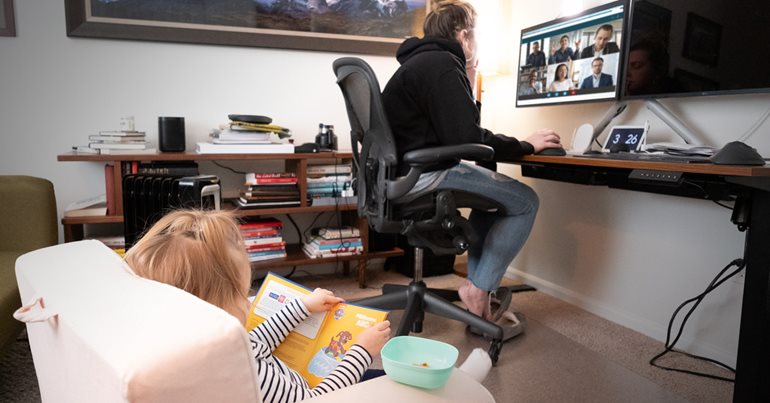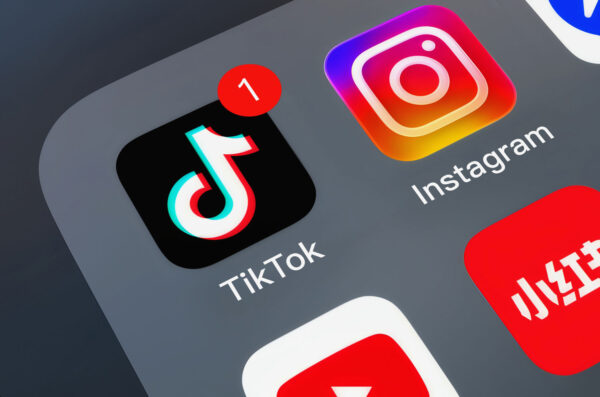
If you’ve been working remotely through the coronavirus pandemic, this may sound familiar: It takes longer to finish a project, and by the end of the day you’re exhausted.
You are likely among the workers who are feeling the effects of an unrelenting online environment, said Dr. Sophie Leroy, associate professor of management in the University of Washington Bothell’s School of Business.
Leroy researches the effects of interruptions on the ability to focus. She coined the term “attention residue” about unfinished work that keeps intruding. She also suggested ready-to-resume notes as a strategy to help.
When the pandemic hit, Leroy focused on what was happening. Over the summer, she conducted two research projects that examined how people are managing during what feels to many like the mother of all interruptions. One study involved 1,000 people in a single professional setting. The other study involved 250 people in a variety of professions.
Research papers will have the details, Leroy said, but it is clear that people working remotely suffer more interruptions. And, tracking performance over several weeks shows interruptions have a negative impact.
Multitasking

There are several kinds of interruptions. Intrusions and multitasking have become more frequent. “An intrusion is when I’m working on something, and then I have a request that is forcing me to switch, even though I don’t really want to switch,” Leroy said. “Both work and nonwork intrusions have increased during the pandemic.”
Multitasking arises from the feeling that we want to make progress on several things at the same time. Usually, we have our own brain to blame. “The brain has a hard time dealing with things that are not complete,” she said. “This feeling — ‘I’m not making progress, not moving forward’ — is very uncomfortable.”
When you’re in a Zoom meeting, for example, the temptation to multitask tends to be stronger than during in-person meetings. Most people have other programs salient on their computer and feel less visible to others when online. When a message or email pops up, or if there’s a pause of a few seconds in the meeting, the urge to make progress somewhere else takes over, Leroy said.
“If one has all those documents or windows open on their computer right in front of them, they’re going to go for it. The brain craves it,” Leroy said. “What people don’t realize is how cognitively exhausting it is to multitask.”
For most people, remote work has meant more frequent interruptions, which has resulted in lower productivity than before COVID-19, Leroy said.
“The time we have available is not the same. It’s cut in tiny little pieces that make it impossible to focus and efficiently move forward,” she said. “People are having days that have never been so fragmented, and it slows them down greatly. The only way to reach the same performance is by expanding the number of hours.”
Can you relate?
Working during the pandemic is mentally taxing, Leroy said. What’s more, people report working all the time without accomplishing more and feeling more exhausted as a result.
It seems that even with interruptions, gender inequities are also slipping through. Across her two studies, women tended to be interrupted more often than men. This is a big issue Leroy said, considering the impact on performance. “It honestly really worries me.”
Given a choice, who do you go to with a question or to seek advice? “Who do I feel I can interrupt?” People seem to be more comfortable interrupting women, Leroy said.
In an office, you might hesitate to interrupt colleagues who look as if they are trying to concentrate. You might save your question for later. Online, however, you might fire off an email or other type of message at any time.
Likewise, you’re on the receiving end of more messages. For example, if you were teaching a class in person, face-to-face, and one student had a question, everyone would hear the answer. Online, “I’m dealing with one person at a time throughout the day,” Leroy said. “The difficulties of coordinating are creating more need for interruptions.”
Interruptions can be frustrating. And if you become frustrated, Leroy said, “you go back to work with that baggage. Negative emotions are going to make you more stressed, make you ruminate, which means you’re less focused.”
So, while interruptions hurt performance, how we respond to these interruptions also matter.
How to manage
Leroy suggests several ways of managing the stress. One way, for those gifted with grace, is acceptance. Maybe someone legitimately needs your time. Look at it from their perspective.
“I know I am going to be interrupted, and I accept it and plan with that in mind,” Leroy said.
She also schedules important work at times of the day when she’s less likely to be interrupted. She lets others know when they would be welcome.
Remember, as well, the ready-to-resume note for unfinished work. When interrupted, take note of where you are and what you are going to do upon return. One recent note Leroy wrote to herself read, “Check 210 unsure.” It means nothing to others, but she knows exactly what to do next.
“I can let go and be more comfortable. It’s not finished, but I know when I’m going to resume it, and I know what I’m going to do,” Leroy said. “I can focus on the interruption, and I’ll be able to efficiently resume the interrupted work.”


